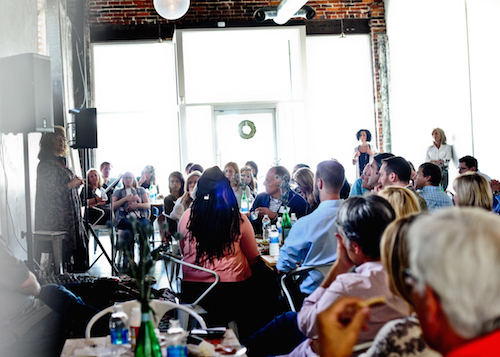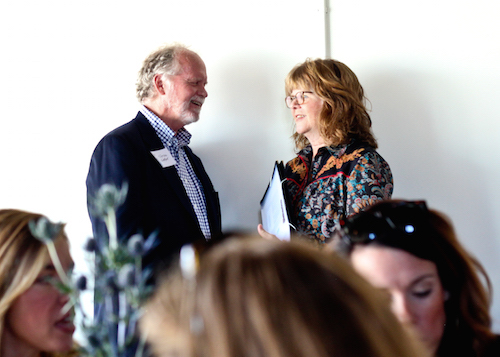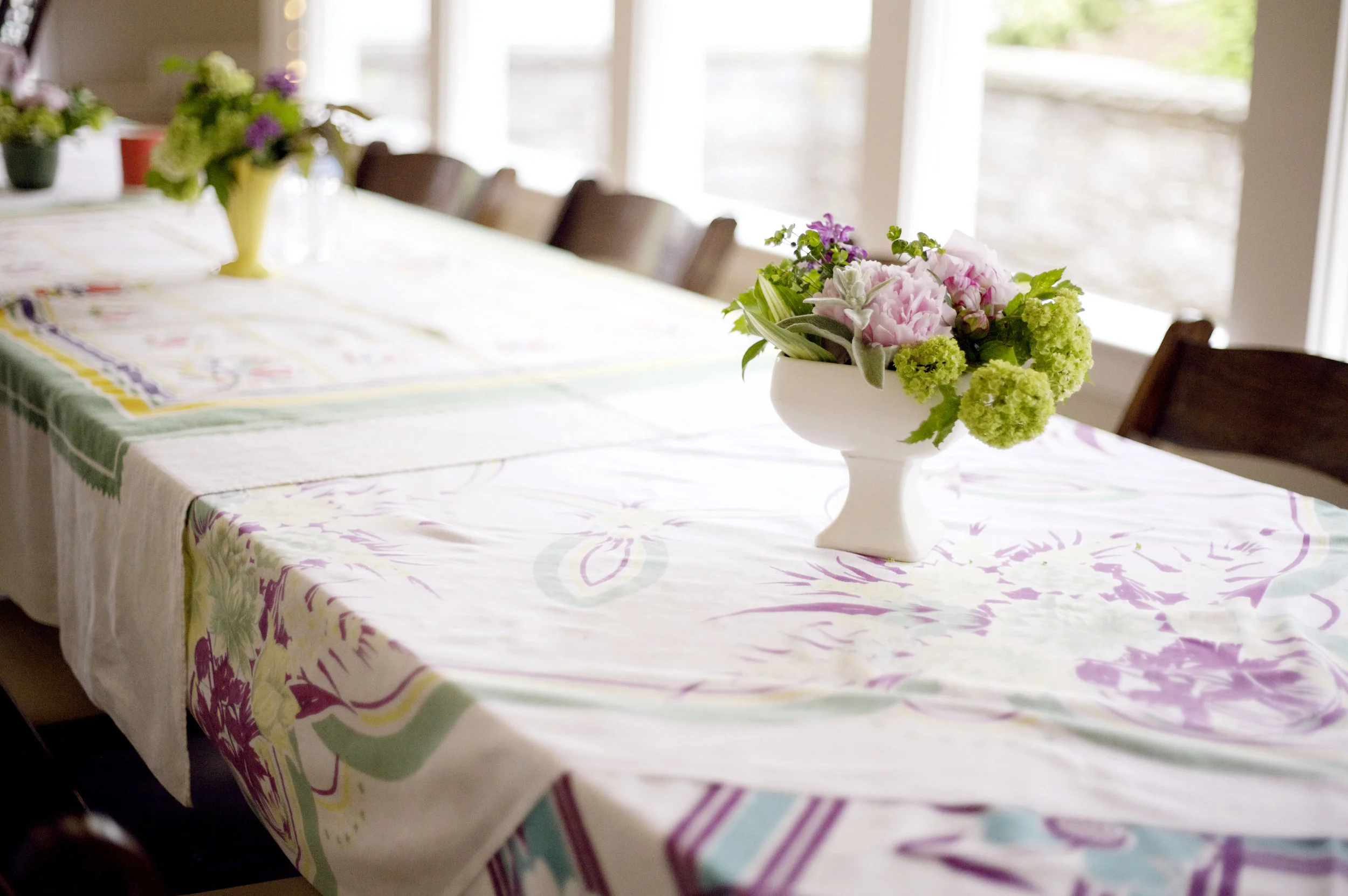Small Things, Slow Work
A talk prepared for The City Beautiful Lunch in Birmingham, Alabama — hosted by InSpero.

Photograph by Charity Ponter
In 1990, a year after we moved our family from California to Nashville, my husband, Charlie, began to dream of a place where artists and others could gather and work out the meaning of their vocations, where they could be in community and receive teaching and hospitality, and where creativity would be encouraged in all areas of human experience. As an artist, songwriter, and record producer, he saw the need for such a place. And as a budding entrepreneur, he wasn't afraid of having a dream and taking a risk.
Chuck’s God-given vision took shape in the pages of his journal where he even gave his imaginary place a name, the Art House. One day as we were driving down Old Harding Pike with our kids we saw a for-sale sign on an old, white country church. We passed it every time we went to the grocery store or left the community of Bellevue in a northern direction. We’d always been drawn to the building, curious about what went on there and who owned it. As we drove by we wondered: “Could that be the Art House?”
Never one to waste time, Chuck quickly made an appointment to see the place and within days, we were knocking at the kitchen door. It was opened by a tall, lanky, older man named Lester Moore whose wife, Sybil, stood at the stove cooking bacon. Sybil had a thick Southern accent and they were both friendly and quirky. After touring the place and hearing a little about it, we got back in the car and burst out crying, neither one of us knowing why.
I struggled to understand my husband’s ideas and convictions in their formative stages, but as we talked in the coming days and sought counsel from others, the words care, service, hospitality, shelter, and teaching were used. Those were resonating words for me, and they hit a deep place of response in my soul. I began to have a vision of my own for the kind of environment I wanted to create and the kind of timeless care I wanted to give if the place became our own.
With a lot of prayer, a lot of intense worry about the huge financial responsibility we were about to take on, and the seed of a vision in our hearts, we locked arms, holding our fear and our faith together, and bought that old church. We couldn’t afford to buy it. The down payment was astronomical compared to what we had at the time. Less than a year before, I’d been praying for a winter coat and money to buy Christmas gifts. But God provided for the vision He’d given us and we came home from the closing with the keys in our pocket.
Before too long, a couple of young men fresh out of college moved to Nashville to help us get going. Our pastor and some of our friends joined us. And within months we had overflow crowds every time we opened the doors.
In the next couple of years, we built my husband’s recording studio on the property and moved our family into the building. From that time on, all the parts of our lives came together on that one property, with hospitality at the center everything. And God provided in ways we could never have foreseen when we bought the place.
I lay out that short history as context to tell you one of that one of the most important lessons I learned in 25 years of Art House work is the greatness of small things. We had a lot of wonderful gatherings over the years and some fancy, famous visitors along the way—theologians and writers, actors and musicians who came to speak at our events or make records in our studio. Even Bono once came and sat at our fireplace, speaking to a room of artists about the AIDS and famine emergency in Africa.
But we also had a lot of young folks who were just starting out, just developing in their vocations, and they became a part of our household, our studio, and our dinner table.
We continued to have larger events from time to time, but more than anything my daily work was to take care of people, one or three or five at a time, and to become a writer, one sentence and one page at a time. I cooked hundreds of meals, sat in three-hour conversations, prepared guest rooms, and walked with people through the hard things of their lives. Most of it was artist care and nurture, but not everyone who came was an artist. They were people God brought into our lives through many different avenues, and everyone needed some kind of care, even if it was just a meeting and some counsel.
Slow by slow, I learned that my vocation was to pray and feed and mentor and write and host, that it was something God had uniquely for me, in company with my husband, in Nashville, in that century-old, renovated country church that sits on a small hill west of the city.
To love our city and care about the arts and creativity has been about loving and caring for individual people. And I think for any of us it comes down to that. Loving a city and its people in general doesn’t mean a whole lot. Loving a city and its people in specific, however our callings lead us, means everything.
Every day at the Art House was another day to live in response to Francis Schaeffer’s words, “There are no little people and no little places.” So much of my work was quiet and behind the scenes, and I had to know that. Either every person mattered or they didn’t. And the work of caring for them either mattered or it didn’t. If it didn’t, I was really wasting my life and I had completely missed my calling. But if it did, then I was right where I was supposed to be.
Well, I did know that it mattered, and that it was powerful in its own quiet way. I knew it so much that I wrote a book about it.
But it is hard to do the small things over and over for the long haul. Even though I knew how much they mattered, I lost sight of it all the time and felt invisible, weary, and lonely in the work.
I recently came across these words in Tish Harrison Warren’s essay “Courage in the Ordinary”: “Everyone wants a revolution. No one wants to do the dishes.” It’s easy to recognize the importance of the big, splashy moments when we come together in community for something we believe in, when we’re recognized for what we do. It’s harder to do the quiet work, to stay the course, to believe that God is with us as we put together our bits and pieces day after day and year after year—creating a painting one brush stroke at a time, making homes and raising children at an average of 20 years per kid, learning complicated fingerings for a jazz composition, showing up day by day to work in businesses, churches, and non-profits. It is hard to connect with the fact that we are a part of what God is doing in the world when it seems so small and the work feels slow and ordinary. Discouragement comes like a thief.
My husband and I tried to quit Art House a couple of times along the way. In the later nineties, we dismantled our non-profit because we (mainly me) were weary of the paperwork and the crowds. But our lives continued on in the very same way. Our dinner table and our beds were often full, and when we wanted to share an author or musician with our larger Nashville community, we just did.
A few years later some folks came along who wanted to gift us with resources to help us do what we were doing and be able to do more, so we had to get that non-profit up and running again! On and on it went, whether there was money in the Art House account or not, it was our calling to live an Art House life as we had come to know it.
When Art House spread to Dallas and St. Paul, I realized that even when the life I had come to know became so ordinary to me that I couldn’t recognize what it meant to others, it had a momentum of its own and a quality of its own, because it was about what God was doing in our midst.
A few years ago, Chuck and I started to talk and pray about moving from the Art House, and finally, a little over a year ago, we sold our beloved family home. It was a terribly hard thing to do, but it was time. We’d been living with an open door to the world for most of our marriage, and now had later-life family responsibilities and other opportunities to pursue.
We anticipated selling to strangers and closing the chapter of our lives on that property. But you know what happened? A family we know and love in Dallas bought the place. And another couple we love and trust, Nathan and Cassie Tasker, moved in with their little boys to serve as directors and hosts, to breathe new life into Art House Nashville. It was a completely unexpected turn of events and an incredible gift. We are still wonderfully involved, but not responsible for everything anymore.
To arrive at all this, we had to let ourselves feel and acknowledge our weariness, to pray and wrestle with it over several years before we could finally say to each other, we’re ready to take steps in the direction of leaving. Now that we’re on the other side of it, I think that’s part of sustaining and surviving a vision over the long haul.
The limitations we experience just might be part of the fruit-bearing process. Yielding to them makes room for change. It allows for someone with new strength to step in, and frees us to do the next thing God has for us or to do the same thing in a new way. I have a lot of new energy for Art House now that my role has shifted. It is God’s work to continue the deeper, longer story of our lives in a way that accounts for constraints and changing life seasons. As Kate Harris writes, “God understands our constraints but is not deterred by them.”
In 2005 as we were prepared to host our first artist retreat, I wrote the following in my journal, “It’s taken so many years and so many stages of Art House and Andi and Chuck to be at this place of connection, understanding, and willingness. The way God shapes a life and a calling is a long-term work. It doesn’t happen overnight. Yet along the way, in spite of where we were in our attitudes and understanding—whether full of vision, available, willing, and united in our hearts and minds, or irritated, frustrated, overworked, and burned out, God has done good things in our midst and brought His will to pass.”
I pray for all of you as you work within your area of calling—whatever is represented in this room today—that as your efforts go forward slow by slow, and day by day, you will remember the faithfulness of God and the greatness of small things.

Photograph by Charity Ponter




















